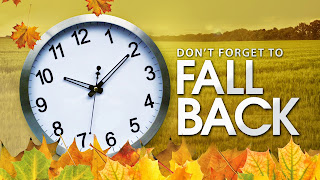 |
| UPDATE: Daylight Saving officially ends at 3am on Sunday morning when the clocks go back to 2am, so the picture is not totally accurate, but, I liked it, so it's here with the post. |
This morning my body did not want to wake up. I was groggy and wooden, like when I wake up really early to go to the airport. Both my boys were the same, in that their internal body clocks refused to acknowledge the time that politicians have told us we have to live by until Sunday.
Unfortunately, every working person so far that I've mentioned the length of Daylight Saving to really enjoys the extra hour of sunlight in the evening. All women, without teenage boys at home who have trouble winding down at night because of the heat. Why not, on that basis, wind our time back another hour or two, so we all get up in very, very early morning and have several more hours of sun in the evening? Why not? Because there's only so much time denial that the human body can cope with.
Now, a recent study has found that heart attacks go up when the time changes into Daylight Saving, causing a little bit of consternation, to say the least:
The study, published online in Open Heart, found that Michigan hospitals attended to an average of 32 heart attack patients every Monday in a three year window - from 2010-2013. A curious pattern emerged: on the Mondays immediately following the start of Daylight Saving Time (when an hour is lost), the average number of heart attack patients went up by around eight.
Also, the number of heart attacks reduced after Daylight Saving ended:
Interestingly, the reverse was found when daylight savings came to an end for any given year, with heart attacks decreasing on the following Monday by 21 percent.
Which made me think - have there been studies on the general health effects of Daylight Saving on people? I know the change in NZ was pushed through because Peter Dunne presented a 40,000 signature petition to Parliament that was signed by mostly sports people who wanted that extra hour of sunlight in the evening in autumn to practice after school and work. There was no study backing up that extending Daylight Saving would be beneficial, just a desire that it be changed, and it was. I know from personal experience that the artificially long Daylight Saving is affecting my sleep and my children's sleep, which much be having a negative effect in general.
Daylight Saving never used to bother me as much as it does now, because it wasn't noticeable as a problem for me. Now it is.

It totally starts too early as well. Mostly when the weather is still raining all the time. It shouldn't start until October - Labour Weekend.
ReplyDeleteI remember that I did a post on this when it first started and by some sleight of hand, they managed to add a whole month, when the proposal was actually for three weeks.
http://nzconservative.blogspot.co.nz/2008/03/daylight-saving-ripoff.html
Daylight saving used to start at Labour weekend and end in early or mid March. People who thought some daylight saving was good decided more would be better. But they didn't take into account the shorter time between sun rise and sun set in autumn and spring.
ReplyDeleteI second Fletch - it start too early and finishes too late.